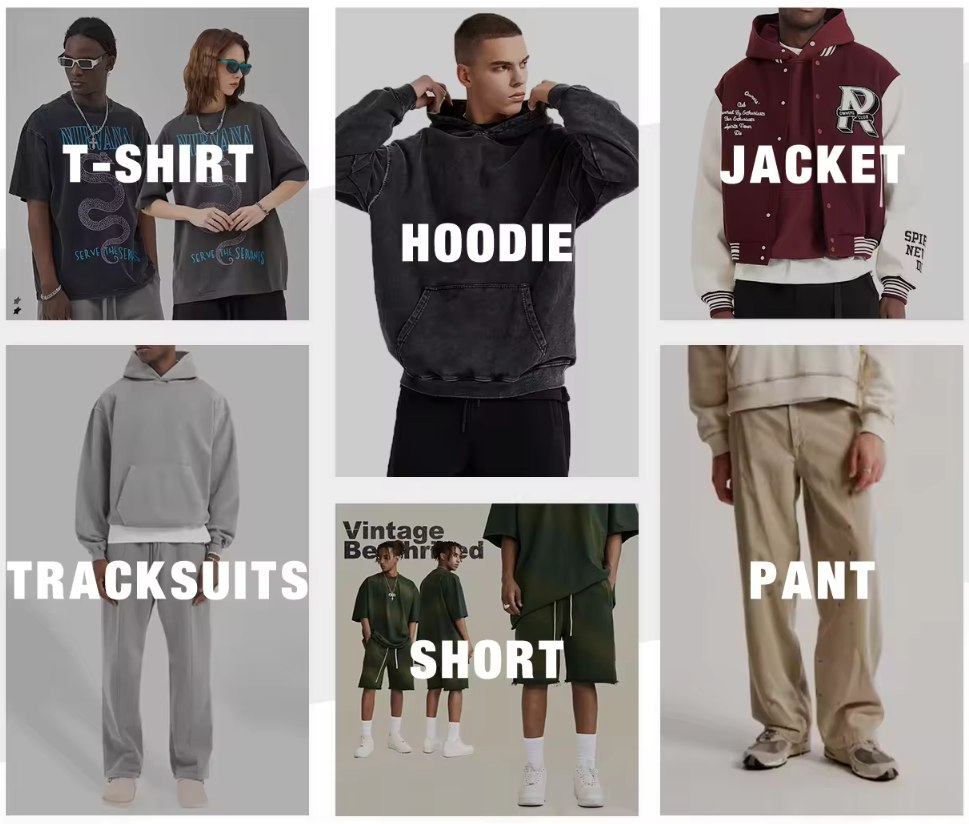The following are some development trends of clothing
Personalization and customization: Consumers are increasingly pursuing uniqueness and self-expression, and the demand for customized clothing, including customization from patterns, sizes to special design details, continues to rise.in fact men acid wash t shirt It is more and more welcomed by our customers, and its market performance is gradually improving. https://leduogarment.com
Diversified aesthetics: Clothing that integrates different styles and cultural elements is more popular, including increased demand for subdivided categories such as large-size clothing and gender-neutral clothing.
Emotional and experiential consumption: Consumers not only pay attention to the clothing itself, but also pay more and more attention to emotional factors such as the experience in the purchase process, brand stories, and the values ??conveyed by the brand.
Increasing awareness of health and comfort: Especially in the post-epidemic era, there is a clear demand for clothing that is skin-friendly, breathable, antibacterial and comfortable to wear. For example, the popularity of sports and leisure clothing continues, and there are more sports elements in people¨s daily wear scenes.
Design and style
Cultural integration: The integration and innovation of different ethnic and regional cultural elements in clothing design, the national trend will continue to develop, and the application of Chinese style elements on the international fashion stage will also increase.
Retro and futuristic interweaving: on the one hand, retro style periodically revives, and on the other hand, design elements with a sense of technology and futurism (such as special glossy fabrics, geometric shapes, etc.) will also be integrated into clothing design.
Sustainable fashion concept: reflected in the use of environmentally friendly materials, such as natural fibers, recyclable materials, etc.; and in the design, it focuses on simplicity, durability and easy matching to reduce waste.
Color trend: more bold and diverse, contrasting colors, soft neutral colors, natural earth tones, etc. will be popular according to different seasons and trend scenes.
Manufacturing
Intelligence and digitalization:
Artificial intelligence assists design and development to predict popular trends and consumer preferences.
Intelligent production equipment is widely used, such as intelligent cutting and intelligent hanging systems to improve production efficiency and quality.
Digital management of the entire supply chain to achieve rapid response and precise inventory control.
Flexible production: to adapt to the market demand for small batches, multiple varieties, and rapid response, especially to meet the production of customized orders.
3D printing technology: There are more explorations and applications in the fields of clothing accessories, special styling clothing, conceptual clothing, etc.
Sales and marketing
Online and offline integration: Omni-channel retail model, online and offline mutual drainage, complementary advantages, providing a seamless shopping experience.
Social media and e-commerce live broadcast: It is an important marketing and sales channel, and the effect of bringing goods through Internet celebrities and stars is obvious.
Virtual fitting, augmented reality (AR) display and other technologies: help consumers better understand the effect and matching of clothing, and improve the online shopping experience.
Fan economy: Brands promote product sales and brand communication by cultivating fan loyalty.
Industry competition and development pattern
The rise of emerging market segments: such as yoga, outdoor, ice and snow in sportswear; children¨s clothing market, underwear market, etc. continue to grow with the development of specific factors.
Brand integration and multi-brand strategy: large enterprises cover different consumer groups and markets through multi-brand strategy, while small enterprises focus more on a single segment to make it more refined and stronger.
International competition and cooperation: On the one hand, the competition between international brands and local brands is intensifying; on the other hand, international cooperation in design, production, market expansion and other links will also increase.